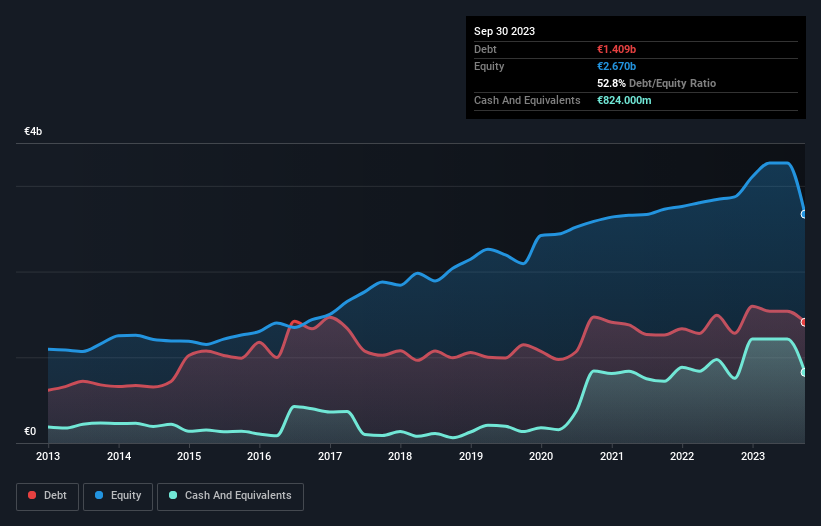
Warren Buffett famously said, 'Volatility is far from synonymous with risk.' When we think about how risky a company is, we always like to look at its use of debt, since debt overload can lead to ruin. We note that MTU Aero Engines AG (ETR:MTX) does have debt on its balance sheet. But the real question is whether this debt is making the company risky.
When Is Debt A Problem?
Debt and other liabilities become risky for a business when it cannot easily fulfill those obligations, either with free cash flow or by raising capital at an attractive price. Ultimately, if the company can't fulfill its legal obligations to repay debt, shareholders could walk away with nothing. However, a more frequent (but still costly) occurrence is where a company must issue shares at bargain-basement prices, permanently diluting shareholders, just to shore up its balance sheet. Of course, debt can be an important tool in businesses, particularly capital heavy businesses. The first thing to do when considering how much debt a business uses is to look at its cash and debt together.
View our latest analysis for MTU Aero Engines
How Much Debt Does MTU Aero Engines Carry?
The image below, which you can click on for greater detail, shows that at September 2023 MTU Aero Engines had debt of €1.41b, up from €1.28b in one year. On the flip side, it has €824.0m in cash leading to net debt of about €585.0m.

How Strong Is MTU Aero Engines' Balance Sheet?
Zooming in on the latest balance sheet data, we can see that MTU Aero Engines had liabilities of €4.92b due within 12 months and liabilities of €2.28b due beyond that. On the other hand, it had cash of €824.0m and €3.03b worth of receivables due within a year. So its liabilities total €3.34b more than the combination of its cash and short-term receivables.
This deficit isn't so bad because MTU Aero Engines is worth a massive €10.1b, and thus could probably raise enough capital to shore up its balance sheet, if the need arose. But it's clear that we should definitely closely examine whether it can manage its debt without dilution. There's no doubt that we learn most about debt from the balance sheet. But it is future earnings, more than anything, that will determine MTU Aero Engines's ability to maintain a healthy balance sheet going forward. So if you want to see what the professionals think, you might find this free report on analyst profit forecasts to be interesting.
In the last year MTU Aero Engines wasn't profitable at an EBIT level, but managed to grow its revenue by 3.3%, to €5.2b. We usually like to see faster growth from unprofitable companies, but each to their own.
Caveat Emptor
Importantly, MTU Aero Engines had an earnings before interest and tax (EBIT) loss over the last year. To be specific the EBIT loss came in at €357m. When we look at that and recall the liabilities on its balance sheet, relative to cash, it seems unwise to us for the company to have any debt. Quite frankly we think the balance sheet is far from match-fit, although it could be improved with time. We would feel better if it turned its trailing twelve month loss of €193m into a profit. So we do think this stock is quite risky. The balance sheet is clearly the area to focus on when you are analysing debt. However, not all investment risk resides within the balance sheet - far from it. Be aware that MTU Aero Engines is showing 1 warning sign in our investment analysis , you should know about...
If you're interested in investing in businesses that can grow profits without the burden of debt, then check out this free list of growing businesses that have net cash on the balance sheet.
New: Manage All Your Stock Portfolios in One Place
We've created the ultimate portfolio companion for stock investors, and it's free.
• Connect an unlimited number of Portfolios and see your total in one currency
• Be alerted to new Warning Signs or Risks via email or mobile
• Track the Fair Value of your stocks
Have feedback on this article? Concerned about the content? Get in touch with us directly. Alternatively, email editorial-team (at) simplywallst.com.
This article by Simply Wall St is general in nature. We provide commentary based on historical data and analyst forecasts only using an unbiased methodology and our articles are not intended to be financial advice. It does not constitute a recommendation to buy or sell any stock, and does not take account of your objectives, or your financial situation. We aim to bring you long-term focused analysis driven by fundamental data. Note that our analysis may not factor in the latest price-sensitive company announcements or qualitative material. Simply Wall St has no position in any stocks mentioned.
About XTRA:MTX
MTU Aero Engines
Engages in the development, manufacture, marketing, and maintenance of commercial and military aircraft engines, and aero-derivative industrial gas turbines in Germany, other European countries, North America, Asia, and internationally.
Excellent balance sheet and good value.
Similar Companies
Market Insights
Community Narratives



